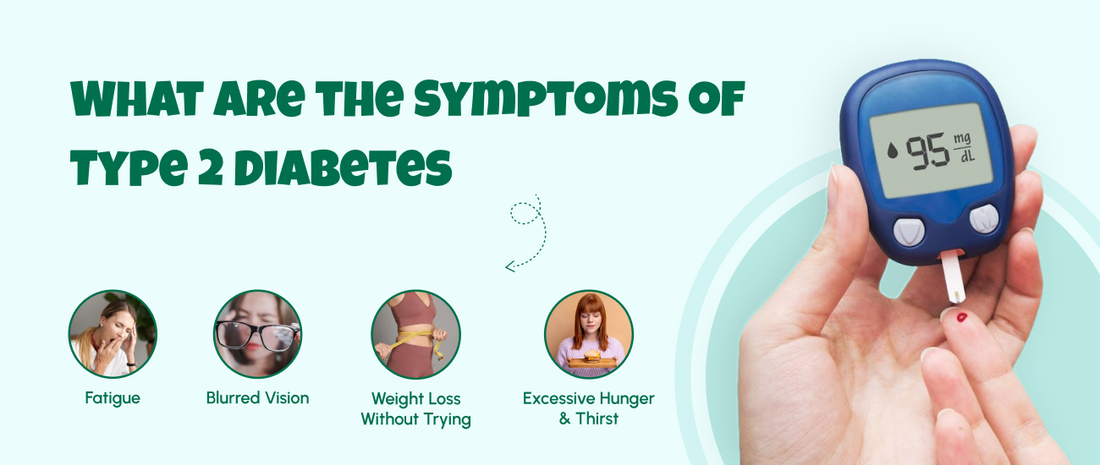What are the Symptoms of Type 2 Diabetes
Jenish Diyora
In today's busy routine, lifestyle diseases have increased a lot, and diabetes is one of them. There are many stages of diabetes, too, which include pre-diabetes, diabetes and type 2 diabetes. Type 2 diabetes is a more chronic condition that affects how your body metabolises sugar (glucose), a vital source of energy. Diabetes develops in the body over time, and diabetes is more affected by routine and lifestyle diseases than the disease itself because it takes a lot of years to develop diabetes, pre-diabetes and type 2 diabetes. Mostly, diabetes is asymptomatic, and by the time diabetes is detected, a lot of damage has already happened to the body. And diabetes 2 is much more dangerous, and if it is not detected on time then it creates serious complications, and can create serious health issues, that is why early diagnosis of diabetes, medicines, lifestyle changes and follow up with the doctor are very important, so let us try to understand type 2 diabetes in some detail.
For the best diabetes medicine, buy from the Medilifet store—a trusted online pharmacy for quality medications.
What is Type 2 Diabetes?
Type 2 diabetes occurs when the body becomes resistant to insulin or doesn't produce enough of it. Insulin is a hormone that helps sugar enter your cells to be used for energy. Without enough insulin, glucose builds up in your blood, leading to various health problems over time. Sugar is a very important component to maintain energy in the body, but if the sugar level in the body increases then with time it starts corroding the veins or organs.
Common Symptoms of Type 2 Diabetes
Symptoms of type 2 diabetes can develop gradually, which is why many people don’t realise they have it until complications arise. Personally I have seen many of my known people who are diabetic or pre-diabetic patients do not feel anything different than they have diabetes, which is why diabetes is also called the silent killer. Let us learn about the common signs of diabetes for at least year. If you or any of your known people get these symptoms, then you should get a checkup done by a doctor about diabetes.
A. Frequent Urination
Excess glucose in the blood causes the kidneys to work harder to filter and absorb it. This leads to increased urination, especially at night. Urination is one of the biggest signs of diabetes, which many people ignore and many people start mistaking it for symptoms of some other disease.
B. Increased Thirst
As you lose more fluids through urination, your body becomes dehydrated, making you feel unusually thirsty. If you feel more thirsty for water, then you need to be careful and consult a doctor.
C. Fatigue
Without enough sugar entering your cells, you may feel tired and sluggish, even after rest. It has been observed that diabetes patients have a lot of fluctuation in their sugar levels, due to which they feel more fatigued even when their sugar levels are low.
D. Blurred Vision
High blood sugar levels can pull fluid from your eyes' lenses, affecting your ability to focus. It is often seen in type 2 diabetes that the patient feels blurred vision.
E. Slow-Healing Wounds
It is often seen in diabetes patients that if they get a wound, then it takes a lot of time for it to heal and stop bleeding because diabetes makes the body very weak and lowers the immunity, which makes it very difficult to cure.
F. Increased Hunger
Fluctuating blood sugar levels may trigger intense hunger, even after meals. If you ever feel very hungry or do not feel hungry at all, then you should understand that you may have a diabetes problem.
G. Tingling or Numbness in Hands and Feet
Prolonged high blood sugar can cause nerve damage (diabetic neuropathy), which is often felt as tingling or numbness. There are high chances of nerve damage in diabetes patients due to which numbness and tingling are quite common in such patients and even if the age of the patient is above 40 then this is quite common and usually the patient feels that he/she feels numbness due to age due to which many patients avoid the worry of diabetes.
H. Darkened Skin Patches
Areas of dark, velvety skin, especially around the neck, armpits, or groin, may signal insulin resistance. If you notice any dark skin patches on your skin, you should get a checkup from a doctor. Diabetes can also be one of the underlying reasons which can change the skin colour and tone, especially if your ethnicity is European, and if you face any kind of skin change must consult your healthcare professional to diagnose the problem.
Causes and Risk Factors
To understand diabetes in detail, it is very important that you know about the causes and risk factors of type 2 diabetes.
Causes
- Insulin Resistance: Your muscles, fat, and liver cells don’t use insulin well.
- Genetics: A family history of diabetes increases your risk. If anyone in your family with whom you have blood relations has diabetes, you should get yourself checked once.
- Lifestyle Factors: Poor diet, inactivity, and obesity contribute significantly. People who do not do daily yoga, exercise have a higher chance of developing type 2 diabetes.
Risk Factors
- After the age of 45, the risk factors to get lifestyle diseases increase.
- Being overweight or obese is also one of the major reasons to get pre diabetes or diabetes.
- A sedentary lifestyle is one of the major causes of lifestyle diseases like high blood pressure and diabetes.
- A family history of diabetes can also cause diabetes in younger ones due to their similarity in diet and DNA.
- High blood pressure or abnormal cholesterol levels can also increase the risk of diabetes, and this is so dangerous if you have both diseases.
- History of gestational diabetes
- Polycystic ovary syndrome (PCOS)
Potential Complications
If left unmanaged, type 2 diabetes can lead to serious complications, including:
- Heart disease is the most common complication you can face if you have diabetes for a long time.
- Stroke is also one of the major complications that can be faced by Diabetic patients, which is why doctors prescribe beta blockers or blood thinners to high-risk patients.
- Diabetes damages the veins and affects the function of the kidneys over time that causing Kidney Damage (Nephropathy)
- Nerve Damage (Neuropathy) is not commonly seen in diabetes patients, and this happens for a long time if your diabetes is uncontrolled.
- Eye Damage (Retinopathy)
- Foot Problems (infections, ulcers, amputation risk)
- Hearing Loss is also something you can face if your blood sugar level is uncontrolled.
- Skin Conditions are so common in diabetes patients, because in diabetic patients, it's seen many times their capabilities to heal a wound are so low.
- Alzheimer's Disease (higher risk observed), diabetes damages the nerves and weakens the immunity, which can cause dangerous diseases like Alzheimer's.
Early detection and proper treatment greatly reduce the risk of these complications.
When to See a Doctor

You should consult a doctor if you notice any of the symptoms mentioned above, especially if:
- If you are above 45 years of age and you have never had a diabetes or blood pressure test done, it is very important for you to get yourself checked by a doctor.
- If your lifestyle is not good or you already have a problem with blood pressure or obesity, you should still get yourself checked.
- You experience excessive fatigue, vision changes, or numbness
- Timely diagnosis can prevent complications and help you manage your health better.
Conclusion
Type 2 diabetes is manageable, especially when caught early. Recognising the symptoms, such as frequent urination, fatigue, and slow-healing wounds, can lead to timely diagnosis and effective treatment. Lifestyle changes, regular monitoring, and appropriate medication can help you lead a healthy life despite diabetes. You can cure lifestyle diseases to a great extent because even if you take medicine for Type 2 diabetes, only you can manage it; for long-term health and healing, only maintaining the correct diet and lifestyle will help.
For effective diabetes medicines, buy from the Medilifet store, a trusted website to purchase your medications safely and reliably online.
FAQs
1. Can Type 2 Diabetes Be Cured?
No, type 2 diabetes cannot be cured, but it can be effectively managed. With proper diet, exercise, medication, and blood sugar monitoring, many people are able to keep their glucose levels within a healthy range and live normal lives.
2. What’s the Difference Between Type 1 and Type 2 Diabetes?
Type 1 diabetes is an autoimmune condition where the body attacks insulin-producing cells. Type 2 diabetes develops over time and is primarily related to insulin resistance. Type 1 usually starts in childhood, while type 2 is more common in adults. In the Human body, high sugar is normal, but if your sugar level is constantly high always then the doctor will recommend the HBA1C test to diagnose and confirm diabetes and their levels.
3. How Is Type 2 Diabetes Diagnosed?
Doctors use blood tests such as: Fasting blood sugar test, HbA1c test (average glucose over 2-3 months), Oral glucose tolerance test (OGTT), These tests help determine how well your body is managing blood sugar. Overall ye if you have eaten high sugar food like sweets and ice cream, then avoid testing for the next 24 hours, because high sugar food can temporarily raise sugar levels it can also show high sugar in your blood.
4. What Foods Should Be Avoided with Type 2 Diabetes?
People with type 2 diabetes should limit or avoid: Sugary snacks and beverages, Refined carbs (white bread, pastries), Fried and fatty foods, Full-fat dairy, and Alcohol in excess. Opt for whole grains, lean proteins, vegetables, and healthy fats instead. To manage diabetes effectively, try to do yoga, exercise with a balanced diet which includes fruits and veggies.
5. Is Weight Loss Important for Managing Diabetes?
Yes, losing even 5–10% of body weight can significantly improve insulin sensitivity and help control blood sugar levels in people with type 2 diabetes.
6. Can I Reverse Type 2 Diabetes with Diet and Exercise?
While it's not considered a cure, some people can put type 2 diabetes into remission by maintaining a healthy weight, exercising regularly, and following a low-carb or balanced diet. This should be done under medical supervision. Many experts say if a diabetes patient follows a healthy routine and avoids bad habits like smoking and alcohol, then it's possible to manage and cure Diabetes to a great extent.




